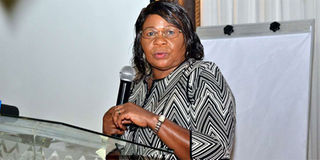
Police parade during the 61st Jamhuri Day celebrations at Dedan Kimathi Grounds in Nyeri Town on December 12, 2024.
Individuals nominated for appointment as members of the National Police Service Commission (NPSC) have warned police officers will be held personally liable for their actions as they pledged to reform a service blighted by lack of public trust.
Prof Collette Suda and retired Assistant Inspectors General of Police, Ms Peris Kimani (Regular Police) and Mr Benjamin Juma (Administration Police), made the vows before MPs as the National Police Service (NPS) struggles with corruption, extra-judicial killings, kidnappings and enforced disappearances.
They spoke before the Administration and Internal Affairs Committee of the National Assembly during their vetting exercise just a day after blogger and teacher, Albert Ojwang, was reported to have mysteriously died while in police custody with the law enforcement officers claiming that it was an act of suicide.
To ensure that the service regains the eroded public trust and confidence, the three NPSC nominees promised to work closely with the country’s oversight and investigative agencies - Ethics and Anti-Corruption Commission (EACC) and the Independent Policing Oversight Authority (IPOA) among others to rid bad elements from NPS.

Principal Secretary for University Education and Research Prof Collette Suda.
“Each police officer will be accountable for their own behaviour, actions. This is a service that has been accused of corruption and other ills and we intend to change that if appointed,” Prof Suda told the committee chaired by Narok West MP Gabriel Tongoyo.
Prof Suda was the only senior government official to hold two senior positions in the Ministry of Education simultaneously, under retired President Uhuru Kenyatta’s administration.
She served both as the Chief Administrative Secretary (CAS) in the Ministry of Education and the Principal Secretary for University Education and Research.
The nine-member NPSC is responsible for overseeing the human resources of the NPS and includes recruiting and appointing personnel, confirming appointments, determining promotions and transfers, exercising disciplinary control, and removing officers from the service.
Mr Tongoyo was specifically alarmed at the reported death of Ojwang at Nairobi's Central Police station cells.
This even as it remains unclear how Ojwang, arrested in Homa Bay County, was transferred to Nairobi to meet his death with the police boss who gave the instructions for his transfer to Nairobi, unclear.
“This man who unnecessarily died in police custody is an example of the many issues surrounding police brutality against the people. How are you prepared to deal with such police excesses?” posed Mr Tongoyo.
Police brutality and wanton corruption specifically among the traffic police, are among the issues that were documented in the taskforce chaired by immediate former Chief Justice David Maraga and whose implementation remains to be seen.
According to Prof Suda, the reforms “we intend to implement in the police service if approved and appointed a police service that is efficient, transparent, accountable and professional to provide security.”

Retired Assistant Inspector General of Police Ms Peris Kimani.
Ms Kimani noted that the officers who are not ready to change will face the full force of the law.
“Those found culpable will be charged in court so as to serve as a good example to the others. As a commission we will establish committees that will work closely with the EACC,” Ms Kimani, with a career spanning 39 years since she joined the service in 1984, told the MPs.
Fresh details from IPOA that has the mandate to investigate police excesses, show that in the last three years- 2022/23, 2023/24 and 2024/25, complaints arising from police excesses have increased from 9,789 to 11,003 with minimal prosecution of the officers involved.
This has seen an increase in complaints recommended for investigations from 995 to 1,229 with a backlog of complaints currently at 3,613 and includes deaths, serious injuries, abductions and enforced disappearances.
Recently, IPOA chairperson Mr Isaack Hassan revealed before a committee of the National Assembly that even as the cases of police violations soar, the law enforcers don’t cooperate with the policing oversight body.
To ensure that police brutality comes to a stop, Mr Hassan wants special courts created to try police officers suspected of excesses including corruption and human rights violations in the country.
“If death is reported in police custody, IPOA responds. We need to consider police violation cases as a matter of public interest.
To deal with this, we need a special court to deal with police violation cases just like corruption, among others, have special courts,” Mr Hassan told the Administration and Internal Affairs Committee.
Misconduct of the police
Mr Hassan made the request for the special police courts as MPs mull expanding IPOA’s mandate to include Kenya Forest Service (KFS) and Kenya Wildlife Service (KWS), whose rangers have also been accused of egregious human rights abuses as they get away scot-free.
On Monday, Mr Juma noted that the EACC and IPOA will also track and document the misconduct of the police for action.
“Each police officer will be accountable for what they do. Human rights will be thoroughly protected and we will ensure that community policing is revived. Public trust must be returned to where it was in the police service,” Mr Juma who joined the service in 1985 told the committee.
The revelations by IPOA and the pressure for police accountability over their actions, come as Kenya National Commission on Human Rights (KNCHR) demanded that parliament sanctions the Ministry of Interior and the Inspector-General of Police Douglas Kanja over “unprecedented” human rights abuses including killings during the Gen Z protests last year.
Violations of human rights
IPOA CEO Mr Elema Halake has also previously recommended to parliament to consider amending the National Police Service Act “to hold police superiors criminally responsible for serious offences including human rights violations.”
A report by KNCHR before parliament, paints a picture of a trigger-happy police service that went to the extent of breaching all the rules in the book of crowd control and meted untold sufferings on Kenyans who were protesting against the punitive tax proposals contained in the Finance Bill 2024.
According to KNCHR Vice Chairperson Ms Marion Mutugi, the State-funded human rights body recorded 60 fatalities since the demonstrations broke out on June 18, 2024 that included 59 male and one female.
The KNCHR dossier notes that during the period of heightened demonstrations in the country against police excesses last year, 1,376 cases of arrests were documented across the 47 counties during the demonstrations.
“The Commission documented 601 injuries across the country which ranged from deep fractures, bullet wounds, soft tissue injuries and inhalation of teargas,” KNCHR report indicates.
Read: Opposition, civil society pile pressure for action against rogue officers who killed protestors
Ms Mutugi however notes that the number of the fatalities could be higher given that the agency was limited in terms of capacity in investigating some of the cases reported.
Mandera East MP Abdirahman Weytan is on record faulting the government policy to always transfer police officers accused of excesses to North Eastern Kenya under the guise of punishment.
“We always see them being transferred North Eastern. But they come and make a lot of money. So what kind of punishment is that?” posed Mr Weytan.
The NPSC members are appointed by the president upon the approval of the National Assembly.
Its membership consists of a person who is qualified to be appointed as a High Court Judge as chairperson, two retired senior police officers and three persons of integrity who have served the public with distinction. The others include the Inspector-General of police and his two deputies.








